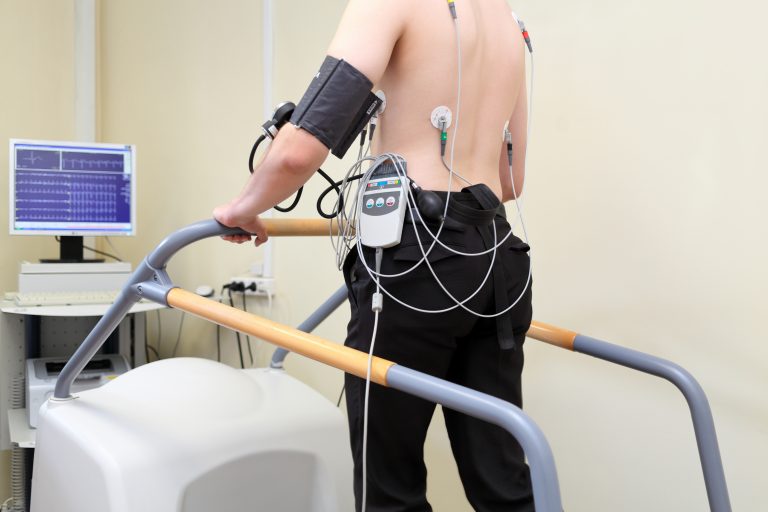A Treadmill Stress Test, or Exercise Stress Test (TMT), is used to examine how well the heart responds to physical exertion. This procedure is essential for diagnosing coronary artery disease, evaluating the success of treatments, and establishing safe exercise limits for those with heart conditions.
What is a Treadmill Stress Test (TMT)?

A Treadmill Stress Test (TMT) measures your heart’s response to exercise. During the test, you walk or run on a treadmill while your heart’s electrical activity is monitored with an electrocardiogram (ECG). The intensity of the exercise gradually increases, and the test evaluates how your heart handles the increased workload.
Types of Treadmill Stress Tests
- Standard TMT: The patient walks on a treadmill with progressively increasing speed and incline while ECG readings are taken to monitor heart function.
- Pharmacologic Stress Test: For patients unable to exercise, a medication is administered to simulate the effects of exercise on the heart. This is sometimes used in combination with imaging techniques like echocardiography or nuclear imaging.
Causes for Performing a TMT
- Chest Pain: To determine if chest pain is related to heart disease.
- Shortness of Breath: To assess the cause of unexplained breathlessness.
- Risk Assessment: To evaluate heart health in patients with risk factors for heart disease.
- Pre-Surgical Evaluation: To assess cardiac function before major surgery.
Symptoms Indicating the Need for a TMT
- Persistent or recurrent chest pain or discomfort
- Unexplained shortness of breath or fatigue
- Dizziness or fainting during physical activity
- Abnormal ECG results during routine exams
Risks of a TMT
- Discomfort: Some patients may experience mild discomfort or fatigue during the test.
- Heart Rhythm Abnormalities: Rarely, the test may provoke irregular heartbeats, particularly in individuals with pre-existing heart conditions.
- Chest Pain: The test can induce chest pain in some cases, although this is generally temporary and resolves with rest.
Complications
- Severe Heart Events: In very rare cases, intense physical stress can trigger serious heart events, such as a heart attack.
- Exacerbation of Existing Conditions: For individuals with severe heart disease, the test might worsen symptoms or provoke a reaction.
Rhythm Heart and Critical Care Hospital: Your Trusted Partner in Treadmill Tests
At our hospital, we have advanced facilities and a team of expert cardiologists to carry out treadmill tests. Our experienced technicians ensure a safe and comfortable environment, while our modern imaging technology provides accurate and reliable results.
For more information, you can contact us at 91 9413564868 / 08048036442 / 07122447288
Highlights of Treadmill Stress Test (TMT) at Rhythm Heart and Critical Care Hospital
- Expert Cardiologists: Our team of highly skilled cardiologists ensures thorough and accurate evaluation of your heart health.
- Advanced Testing Equipment: We use the latest technology to deliver precise and reliable results during the TMT.
- Experienced Technicians: Our technicians are trained to create a safe and comfortable environment for your stress test.
- Comprehensive Care: We offer personalized care and detailed guidance before, during, and after the test to ensure the best outcomes.
- Patient-Centered Approach: Your comfort and safety are our top priorities, and we take the time to address all your concerns.
Frequently Asked Questions:
Why do I need a TMT?
- A TMT is recommended to assess your heart health, especially if you experience symptoms like chest pain, shortness of breath, or if you have risk factors for heart disease.
Is Treadmill Stress Test (TMT) safe?
- Yes, the TMT is generally safe. Our trained staff closely monitors your heart rate, blood pressure, and ECG throughout the test to ensure your safety.
5. How long does the TMT take?
- The entire procedure typically takes about 30 to 45 minutes, including preparation and recovery time.
. What should I do if I feel unwell during the test?
- If you experience any discomfort, dizziness, or unusual symptoms during the test, inform the technician immediately. The test can be stopped at any time if needed.
10. Can I go home right after the test?
- Yes, you can go home after the test unless your doctor recommends further monitoring or additional tests.


